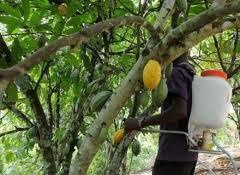
Minority spokesperson on Agriculture in Parliament, Dr. Akoto Owusu Afriyie, has criticised government for failing to adequately monitor the mass-spraying exercise of cocoa farms.
The cocoa mass-spraying exercise was instituted in 2001 by the Ghana Cocoa Board (COCOBOD), in consultation with government, to support cocoa farmers eliminate cocoa diseases and help increase production.
Dr. Owusu Afriyie complained that the exercise is discriminatory, expressing concern about the limited number of bottles of insecticides allocated to the various cocoa-growing districts for the exercise.
COCOBOD is mandated to monitor the mass spraying exercise and has hinted at phasing-out its free mass-spraying of cocoa farms across the country within the next three years.
This decision has been rejected by the farmers and stakeholders.
There is no doubt that since implementation of the mass-spraying exercise, the production of cocoa in the country has increased significantly.
Dr. Akoto Owusu Afriyie has since cautioned COCOBOD against the planned phasing-out of the programme.
He advised it to take measures that solve the implementation challenges confronting the exercise, rather than abandon the cocoa farmers to their fate.
According to Dr. Owusu Afriyie, cocoa production reduced over the years because inputs for the mass-spraying exercise were being smuggled to neighbouring countries.
He said cocoa farmers in the country will massively benefit from the exercise if government has good monitoring systems in place, rather than thinking of phasing it out.
“The current free fertilising programme is strengthening the black market. What is the point of all this to sit in Accra at the fourth-floor of Cocoa House and announce that everything is free for the farmers, without ensuring that farmers are the beneficiaries?” he asked.
The Member of Parliament (MP) for Kwadaso said his checks have revealed that farmers are prepared to now buy the fertilisers and other farm inputs -- which hither-to were given for free -- at full cost on the open market.